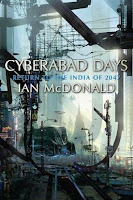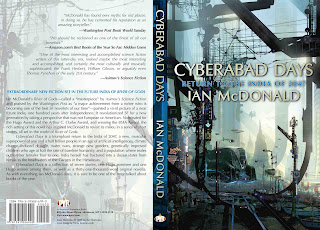 Like an establishment known for its fine wine, Mr Ian McDonald needs no bush hung in front of his enterprise to attract eager customers, but when hero editor Lou Anders asked me to write an introduction to Ian’s collection of short stories, Cyberabad Days,
Like an establishment known for its fine wine, Mr Ian McDonald needs no bush hung in front of his enterprise to attract eager customers, but when hero editor Lou Anders asked me to write an introduction to Ian’s collection of short stories, Cyberabad Days, I was glad to oblige. Here it is.
I was glad to oblige. Here it is.
America Is Not The Only Planet
by
Paul McAuley
According to William Gibson, the future is already here — it’s just not evenly distributed yet. A cursory glance at recently published science fiction shows that depictions of the future aren’t evenly distributed either: the majority of science fiction depicts futures dominated by American sensibilities and cultural and economic values, and inhabited by solidly American characters. Sure, there have always been writers like Maureen McHugh and Bruce Sterling, and more recently Nalo Hopkinson and Paulo Bacigalupi, who have embraced a broader, global view of the future, but the default mode of science fiction is that of American hegemony, and an assumption that the values of Western late-stage free market capitalism will endure pretty much unchanged even unto empires flung up around the farthest stars. This isn’t surprising, because modern science fiction was invented in the USA in the 1930s, and the USA is still the dominant market place for written science fiction, and it’s the major producer of science-fiction television shows and movies, too). But even before the ill-advised War on Terror and the global economic crash, it’s been clear that although the twentieth century can legitimately be called the American century, in the twenty-first century the nexus of technology-driven change and economic and political power will almost certainly be located elsewhere. In China or India or Brazil; maybe even in Russia or Europe, if those old powers can shake off the chains of history and truly reinvent themselves. But most definitely not in the USA.
British science fiction writers have a long tradition of filtering the memes and tropes of modern SF through their own cultural viewpoint; they’re the aliens in the Yankee woodpile. In Arthur C. Clarke’s space fictions, British astronauts drank tea and fried sausages in their lunar excursion vehicles, showed the heir to the throne how to jockey rockets into orbit, and returned alien artifacts to the British Museum rather than the Smithsonian. The New Worlds’ crew turned their backs on the Apollo programme and dived into inner space. And the Interzone generation of writers infused the heartland dreams of SF with a globalized ethos: the future as London’s babylon, a vibrant, sometimes frictive patchwork plurality of cultures — Somalis in Kentish Town, Bangladeshis in Brick Lane, Turks in Green Lane, Congolese in Tottenham Hale, and so on and so forth — writ large.
Ian McDonald, to get to the point of this introduction, was in on the globalization of science fiction right from the beginning of his career. His first novel, Desolation Road, mapped Bradbury’s Mars onto Gabriel Garcia Marquez’s One Hundred Years of Solitude; later novels and stories featured Africa as a venue for transformative biotech and alien invasions; all showcased his ability to use cut-ups and mixmastered imagery appropriated from the vast storehouse of science fiction and the vaster stores of the happening world to create vivid bricolages crammed with eyekicks, to do the police in a variety of voices. River of Gods, widely praised and nominated for all kinds of awards, was a significant evolutionary leap in his game. Set in an epic, complex, and richly detailed depiction of a near-future India split into competing yet interdependent states, its narrative is likewise split into a multiplicity of viewpoints, detailing from a variety of perspectives the attempt by a community of artificial intelligence to win legitimacy and freedom either by reconciliation with or independence from their human creators. The stories collected here share the same setting as River of Gods. History runs like a river through them, yet they are closely focussed on the dilemmas of people caught up in the currents of social and technological change: a boy who dreams of becoming a robot-wallah, fighting wars via remotely-controlled battle robots, is given a sharp lesson in the real status of his ultra-cool heroes; a young woman who was once feted as a god tries to find a new role in a world where AIs are the new deities; the marriage between a dancer and an AI diplomat is overshadowed by the growing hostility between the human and machine spheres. McDonald’s characters are vividly and sympathetically drawn; his prose is richly infused with a rushing immediacy; the exoticism (to Western sensibilities) of India’s crowded and chaotic cities and her rich and ancient and complex mythology infuse and complement and transmute the exoticism of a future as rich and bewildering and contradictory as our present, a hothouse venue of technological miracles teetering on civil war and every kind of social change. Unlike the futures of default-mode science fiction, conflict is not resolved by triumph of thesis over antithesis, but by adjustment, adaptation, and accommodation. In McDonald’s Bollywood babylon, history is in constant flux, always flowing onwards, never staying still, yet preserving in the shape of its course certain immutable human truths. Things change; yet some things remain the same. The future of this clutch of fine stories is only one of many possible futures, of course, but it as exciting and challenging and humane and self-consistently real as any of the best: we can only hope that we deserve one like it.
made the list! Here’s the press release!












